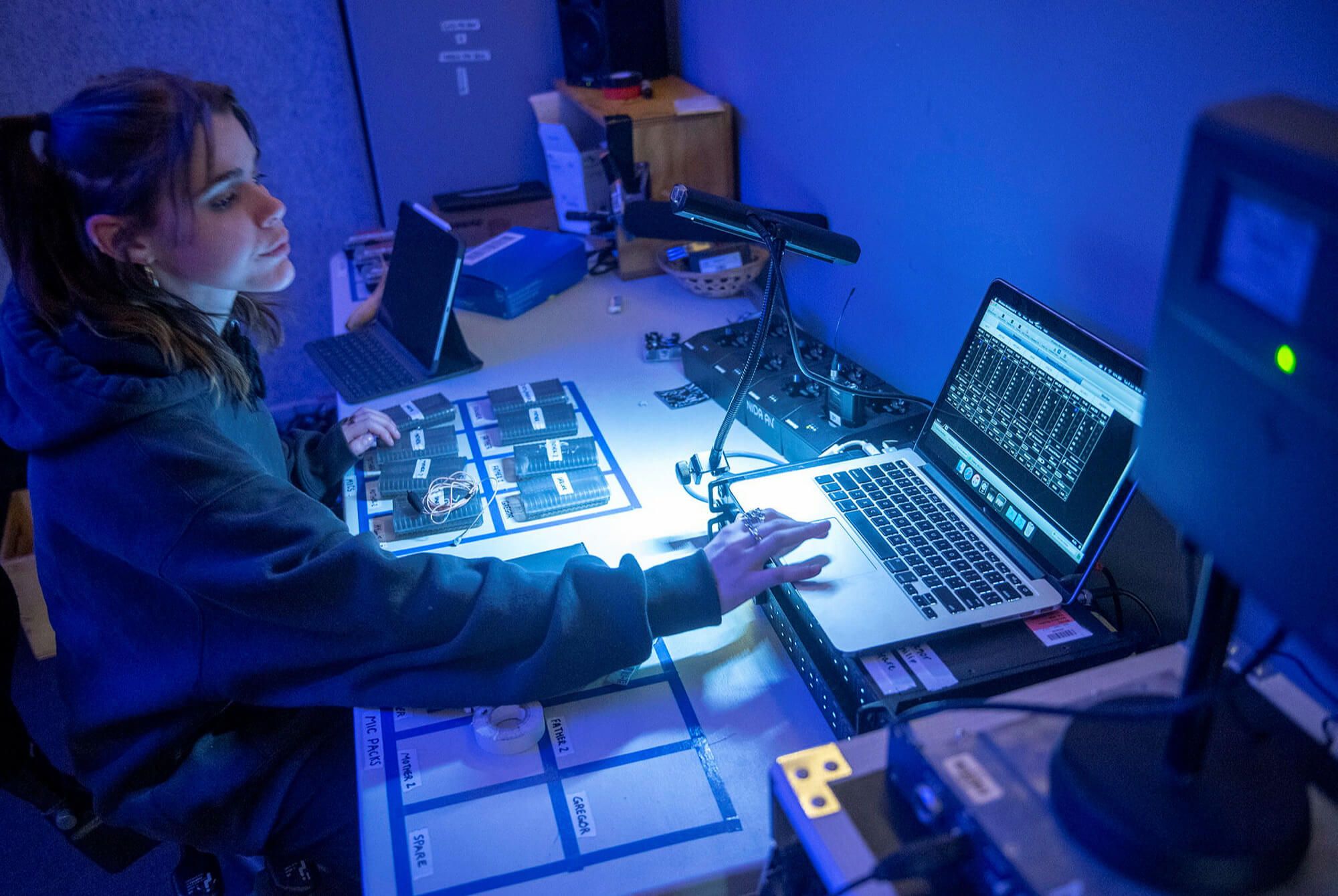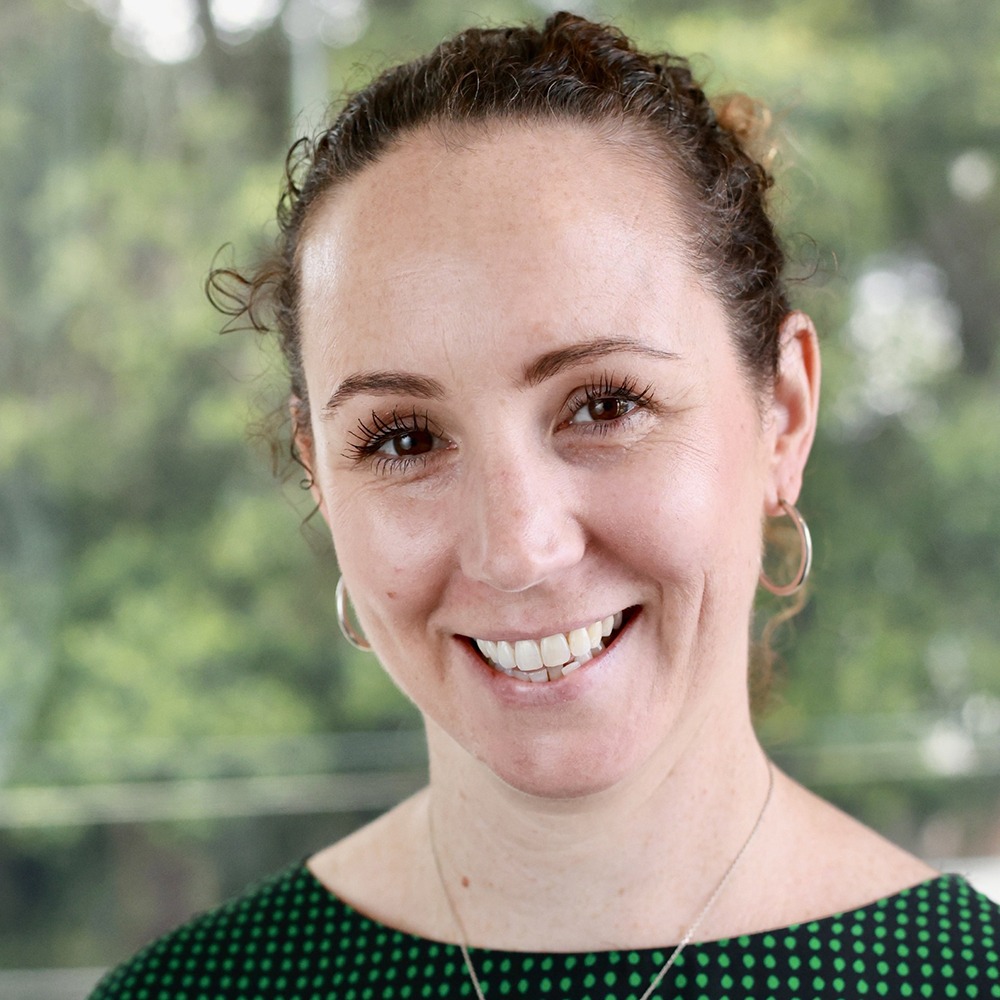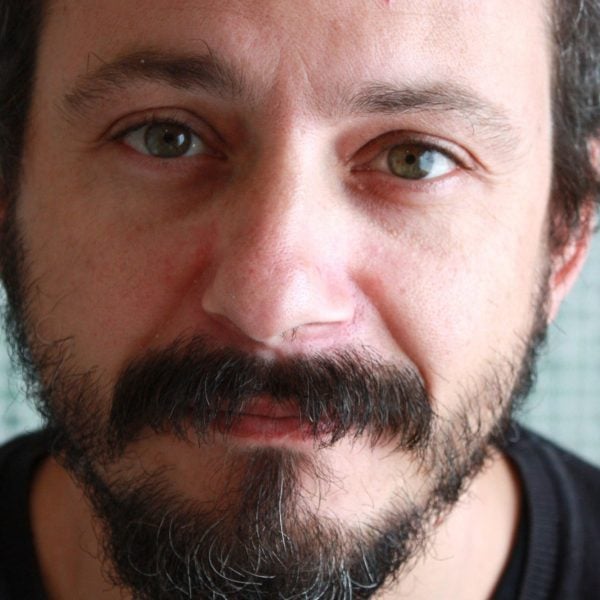Course Overview
This immersive, practice-based course with a high employment outcome will help you to become a successful and adept technical theatre and stage management artist and practitioner.
You will learn to manage and integrate the technical requirements for theatre, live events, musicals, opera and concerts. You will graduate equipped with the broad range of experience and knowledge required for a leadership role in the industry.
You will learn the theory and practice of stage management, lighting, sound, technical drawing and video for live performance. Supported by industry guests and mentors, you will acquire a high level of practical, hands-on experience in live productions as a production stage manager, lighting, sound or video designer, technical supervisor and as technical crew during NIDA’s mainstage production seasons.
In your final year, you will have the opportunity to do industry placements with arts companies, festivals and practitioners of your choice to build real world experience and professional networks as you embark upon a sustainable career in the arts as a highly sought-after technical theatre and stage management practitioner.
- Demonstrate and apply an in-depth knowledge of Technical Theatre and Stage Management practices underpinned by a broader knowledge of the dramatic arts both in Australia and internationally.
- Apply technical, managerial, interpersonal and design skills and knowledge to collaborate and provide leadership within creative teams that create work in a range of challenging and engaging contexts, genres, platforms, and modes of performance.
- Interpret, evaluate, communicate, and collaborate on ideas, problems and information using concepts, vocabulary and documentation that is appropriate to technical theatre and stage management practitioners.
- Work autonomously and collaboratively in ways that acknowledge and respect the contribution that all roles make to interdisciplinary creative processes.
- Utilise professional and entrepreneurial skills to manage the business aspects of their own practice.
- Recognise and contextualise their own practice within the broader social, political, cultural, and ethical contexts of technical theatre and stage management and performance making practice.
Students are at NIDA from 9am to 6pm from Monday to Friday. During production terms students may also be required for rehearsals after hours and on weekends.
Additional time also needs to be allocated to library work, research, preparation for classes and private study. For this reason it is difficult for NIDA students to maintain regular part-time jobs. Studying at NIDA is a big commitment so students need to manage their time and resources carefully.
All NIDA Bachelor of Fine Arts degrees are three-year full-time courses. All NIDA Master of Fine Arts courses, except for Cultural Leadership, are 18-month full-time courses.
2025 Semester Dates
Semester 1: 10 February – 20 June 2025
Welcome Week: 3 – 7 February 2025 (First years & MFA only)
BFA Term 1: 10 February – 11 April 2025
Mid-semester break : 14 – 25 April 2025
BFA Term 2: 28 April – 20 June 2025
Semester 2: 21 July – 21 November 2025
BFA Term 3: 21 July – 12 September 2026
Mid-semester break: 15 – 19 September 2025
BFA Term 4: 22 September – 21 November 2025
Term dates exclude public holidays. View 2025 NSW public holiday dates.
Year One
- Interdisciplinary Collaboration
- Technical Theatre
- Stage Management
- Dramaturgy and Performance Analysis
- Production Processes
- Performance and Ideas
- Performance Makers
Year Two
- Interdisciplinary Collaboration
- Technical Theatre
- Stage Management
- Dramaturgy and Performance Analysis
- Contexts of Performance
- Production Processes
- Student Led Project
Year Three
- Interdisciplinary Collaboration
- Professional Pathways
Our graduates have been employed by Sydney Theatre Company, Sydney Opera House, Sydney Dance Company, Bangarra Dance Theatre, Melbourne Theatre Company, The Australian Ballet, Cirque du Soleil, Abbey Theatre (Dublin), Sydney Festival, Commonwealth Games, Brolly Productions (London), WSP Parsons Brinckerhoff Asia Pacific, PRG Scenic Technology (USA) and more.
Potential careers
- Theatre-maker
- Production manager
- Technical manager
- Stage manager
- Event manager
- Lighting designer
- Sound designer
- Video for live performance designer
- Theatrical technician
Meet the team
Admission Criteria
Domestic students with overseas qualifications must supply certified translations of their qualifications.
International students with academic qualifications that are not in English will need to attach a certified, official translation in English in application portal.
For more information, read our Admissions Transparency Statement.
Entry is by merit selection.
General entry requirements for accredited courses are as follows:
- Have completed a Higher School Certificate or equivalent qualification at the end of high school for undergraduate courses.
- Be 18 years of age by 31 March in the first year of enrolment for domestic students in undergraduate programs.
- Be proficient in written and spoken English.
- Have skills and knowledge appropriate to the level and discipline into which the applicant is seeking to gain admission.
- Have an evidenced interest in the performing arts.
Applications are encouraged from domestic applicants who:
- Have previous higher education study.
- Have vocational education and training.
- Have work and life experience (having left school more than two years ago).
- Are recent secondary education applicants.
- Identify as Aboriginal and Torres Strait Islander.
Applications are encouraged from international applicants who:
- have successfully completed a Genuine Temporary Entry (GTE) interview.
- have completed the equivalent of a Year 12 or final year of high school qualification
- have an English language proficiency equivalent to IELTS 7.0 with no band score less than 6.0 (IELTS 8.0 for BFA Acting).
- Are 18 years of age at date of enrolment for international students.
- Have skills and knowledge appropriate to the level and discipline into which the applicant is seeking to gain admission.
- Have an evidenced interest in the performing arts.
Recognition of Prior Learning is an assessment process that involves assessment of an individual’s relevant prior learning (including formal, informal and non-formal learning) to determine the credit outcomes of an individual application for credit.
NIDA may grant credit for:
- Formal study undertaken in recognised education institutions in Australia, including universities, colleges, TAFE and other post-secondary education institutions and for study at recognised overseas institutions.
- Credentialed courses provided by recognised professional bodies, employers and other authorities, where appropriate certification is available; and
- Prior learning, where such learning can be sufficiently evidenced.
The principles underlying the assessment of credit transfer/Recognition of Prior Learning (RPL) applications are that the policy and procedures are:
- Aligned to the Higher Education Standards Framework and the Vocational Standards for RTOs.
- Designed to maintain the integrity and reputation of NIDA’s accredited courses for which credit or RPL is applied and support the collaborative nature of NIDA’s conservatoire training model.
- Consistent, equitable, transparent, and accountable.
- Based on processes of comparable standard and integrity to those used to assess the relevant subject.
- That students are not disadvantaged in achieving the expected learning outcomes for the course of study or qualification.
NIDA Recognition of Prior Learning Policy
Domestic students with overseas qualifications must supply certified translations of their qualifications.
We select students who:
- demonstrate commitment and motivation in relation to the arts, entertainment and related industries, to their chosen discipline, and to the course of study
- provide evidence of their capacity to work creatively and imaginatively
- demonstrate an aptitude to collaborate with peers as part of a creative process
- demonstrate a range of knowledge, skills, technical abilities and/or problem-solving techniques relevant to their discipline
- demonstrate cultural and contextual awareness
- articulate and communicate ideas clearly
Due to the volume of auditions carried out, we are unable to provide you with individual feedback. The decision of the audition panel is final.
It is not possible to defer an offer of a place at NIDA.
How to apply
Applicants MUST apply online via the NIDA website.
Entry to the BFA Technical Theatre and Stage Management is by interview. Applicants will need to prepare a creative response as part of their application and complete a project prior to their interview.
The application process for the Bachelor of Fine Arts (Technical Theatre and Stage Management) consists of two rounds:
- Round One – online application and creative response
- Round Two – Creative project and interview
Only applicants who are successful in Round One will be invited to complete the production project and to attend an interview.
1. CREATIVE RESPONSE
Write a creative response to a live production or event that you have seen or engaged with that inspires, interests, or ignites your passion in any way.
- A minimum of 300 – maximum of 700 words.
- Rather than just a synopsis of the production/event, show us your personal response and analysis.
- Describe how the creative choices and technical elements of the production/event supported the narrative or audience experience of the event.
- In addition to written words, you are welcome to include supplementary material that supports or illustrates your response. Examples of additional material cold be, but are not limited to photographs, sketches and technical drawings.
You will upload your Creative Response in the ‘Course Specific Application Requirements’ attachment section.
It must be a word document or PDF clearly titled with your name as follows: fullname_creative response_BFATSM_2024.
2. TTSM PROJECT AND INTERVIEW
Select one Select one script from the list below. The texts that have been nominated should be readily available from your local library, bookstore, or online. Should you have any difficulty obtaining any of these texts, please contact NIDA: [email protected].
- The Seven Stages of Grieving by Wesley Enoch and Deborah Mailman (play)
- Rhinoceros by Eugene Ionesco (play)
- Scorched by Wajdi Mouawad (play)
- Blood Wedding by Frederico Garcia Lorca (play)
- Black is The New White by Nakkiah Lui (play)
- Neighbourhood Watch by Lally Katz (play)
- Kiss of the Spiderwoman by Manuel Puig (play)
- The Man Who Turned Into a Stick (death) by Kobo Abe (play)
- Brand New Ancients by Kae Tempest (play)
- The Resistible Rise of Arturo Ui by Bertolt Brecht (play)
- 21 Chump St Book, Music and Lyrics by Lin-Manuel Miranda (musical)
You must read the script and prepare a project that demonstrates how you would stage your production. You may present your ideas in any format you choose (e.g. images, sketches, slides). You should consider one or more of the following production elements – lighting, sound, video and staging. It may be staged in a venue/location of your choice or you may use the provided theatre plans (below).
Download theatre plans: Theatre Plan (PDF 1.6MB) and Theatre Section (PDF 1.3MB).
While all production elements should be considered, at least one technical element (the set design, lighting design, sound design or video design) must be thoroughly investigated. This should be demonstrated through appropriate references and documentation.
Any digital files for your project should be submitted EITHER as a single PDF, with all elements; OR as a compressed zip folder containing all the required elements. You will send these documents via email. This email will be provided on completion of Round One. It must be clearly titled with your name as follows: fullname_project_BFATSM_2025.
How to prepare for your interview
Each applicant will be interviewed for approximately 30 – 45 minutes. All interviews will take place via Microsoft Teams, link to be provided prior to interview.
During the interview, we will discuss your project; your ideas about theatre, film and the broader creative industry; and why you want to study Technical Theatre and Stage Management at NIDA. There will be an opportunity for you to ask any questions you may have about NIDA or about the interview itself.
The following should be prepared in advance to be discussed at your interview:
- How performers will move around on your set – particularly entrances and exits
- The practical and creative motivation behind your design decisions
- The physical characteristics of your set
- How you will manage any safety considerations for your cast and crew
- How any set pieces or props will move on, off or around the stage
- How you will achieve any scene changes
Some tips:
NIDA recognises that interviews can be stressful, but every effort will be made to ensure your experience will be as relaxing and enjoyable as possible. Remember, the more time and effort you put into the project in advance, the better prepared you will be and the more you will benefit from the interview and discussion.
The interview process is friendly, informal and open, and is designed to give you the very best opportunity to indicate your potential and readiness to study at NIDA. However, should you have any concerns with the interview process or with what is said to you during the course of the interview, please express your concern immediately, or talk it over with a member of the interview panel before you leave.
Fees and Scholarships
Domestic and international students are required to pay tuition fees by the due date each semester.
Domestic Students
Domestic tuition fees overview
Domestic students are Australian citizens, Australian permanent residents and New Zealand citizens.
| Degree | Course duration | 2025 Annual tuition fee $AUD* | Estimated total course tuition fee* |
|---|---|---|---|
| Bachelor of Fine Arts (Technical Theatre and Stage Management) | Three years | $17,400.00 | $52,200.00 |
2025 Domestic Undergraduate Student Fee Schedule
2024 Domestic Undergraduate Student Fee Schedule
International Students
International tuition fees overview
Fees and financial assistance vary for international students, please read full details here.
| Degree | Course duration | 2024 Annual tuition fee $AUD* | Estimated total course tuition fee* |
|---|---|---|---|
| Bachelor of Fine Arts (Technical Theatre and Stage Management) | Three years | $36,720.00 | $110,160.00 |
2025 International Undergraduate Student Fee Schedule
2024 International Undergraduate Student Fee Schedule
*The tuition fees are reviewed each year and if you enrol you are liable for the additional tuition costs if the tuition fees rise during the course of your enrolments.
** EFTSL – Effective Full-Time Study Load: indicates the relative study load of a subject against a full-time study load of 1.0 for an academic year. For consistency, the EFTSL have been rounded to 3 decimal places. This is not indicative of the full value of the EFTSL but represents an accurate load for fee calculations.
Australian citizens and holders of permanent humanitarian visas are eligible for an Australian Government FEE-HELP loan for all or part of their tuition fees. For more information about FEE-HELP please read the information below and visit Study Assist.
What is FEE-HELP?
FEE-HELP is the Australian Government loan scheme that assists eligible students to pay their tuition fees, so that students do not have to pay tuition fees up-front. FEE-HELP can cover all or part of a student’s tuition fees.
In 2024, the FEE-HELP loan limit is $121,844 for most students.
A loan fee of 20% applies to FEE-HELP loans for undergraduate courses of study. The FEE-HELP limit does not include the loan fee.
The Government pays the amount of the loan directly to NIDA. Students repay their loan through the tax system once their income rises above the minimum threshold for compulsory repayment.
For more information go to https://www.studyassist.gov.au/.
Who is eligible for FEE-HELP?
- You are eligible for a FEE-HELP loan if you are either:
- an Australian Citizen; or
- hold a permanent humanitarian visa
Those NOT eligible for FEE-HELP are:
- New Zealand citizens – refer to the Study Assist website
- Australian permanent residents
- Overseas students
Financial Assistance
Eligible students, who are Australian residents, can apply to Centrelink for financial assistance through Youth Allowance, Austudy or ABSTUDY. Visit Centrelink or call 132 490 for more information.
NIDA is committed to making its education and learning more accessible to the most creative and talented individuals across Australia with a range of scholarships aimed to remove financial barriers, providing students with the opportunity to study at NIDA while being relieved of some of the cost of living, relocating and study expenses.
NIDA scholarships are made available by the generous support of donors, sponsors, corporate partners, trusts and bequests, through the NIDA Foundation Trust, and enable a significant increase in financial assistance to ongoing and students commencing study in 2025.
Further Information
The table below gives an indication of the educational backgrounds of the 2024 commencing undergraduate BFA peer cohort in all disciplines at NIDA.
It should be noted that as selection and admission to courses at NIDA is based on merit the statistics below may not be indicative of the educational backgrounds of commencing cohorts on a year-to-year basis.
L/N – Low numbers: the number of students is less than 5.
| Applicant Background | Number of students | Percentage of all students |
|---|---|---|
| (A) Past higher education study | 14 | 22.5% |
| (B) Past Vocational Education and Training study | 16 | 25.8% |
| (C) Recent secondary education Admitted on basis of other criteria and ATAR was not a factor | 26 | 41.9% |
| (D) Work and life experience | 20 | 32.3% |
| International students | 0 | N/A |
| All students | 62 | 100% |
NIDA’S Registration Status | Registered as a Higher Education Provider by TEQSA | |
|---|---|---|
| Registration Renewal Date | 25 June 2025 | |
CRICOS Registration | Code: 00756M | This allows NIDA to enrol international students on student visas into CRICOS approved courses. |
Self Accrediting Authority* | Yes – partial self accrediting | Registered Higher Education providers may be authorised by TEQSA to self-accredit courses of study. |
| Course Name | Status | CRICOS Code |
| Bachelor of Fine Arts (Technical Theatre and Stage Management) | Self-Accredited by NIDA under TEQSA’s determination of Self-Accrediting Authority for NIDA. | 083701F |
Frequently Asked Questions
Looking for more info about NIDA courses, admissions and facilities? Check our FAQ page for answers to commonly-asked questions from future students.
This qualification is recognised in the Australian Qualifications Framework
The Australian Qualifications Framework (AQF) is the national policy for regulated qualifications in Australian education and training.
Read more information about the AQF.
What does it take to put on a show?
Take a peek behind the curtain to see how our students collaborate each year on our June and October Student Production seasons.






